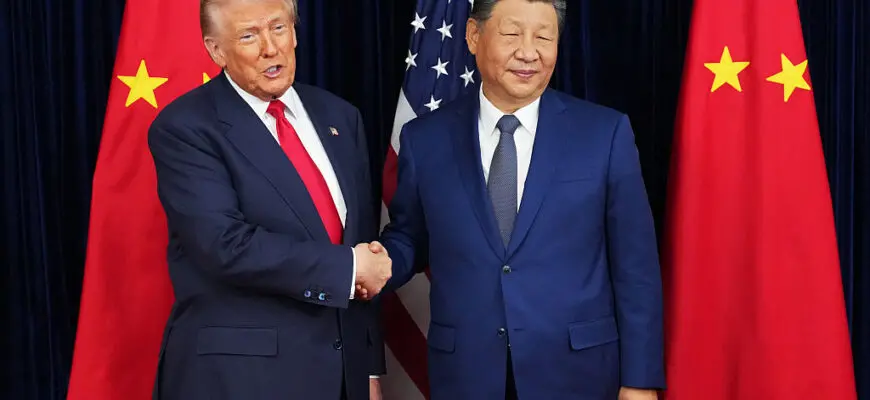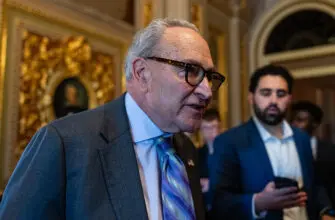U.S. President Donald Trump and Chinese President Xi Jinping announced they reached a trade deal following their highly anticipated meeting in Busan, South Korea, successfully pulling their countries back from the brink of an all-out trade war. The agreement formalizes a framework reached earlier this week and immediately eases months of escalating trade tensions.
The high-stakes meeting took place Thursday morning in Busan and lasted close to two hours. Trump was accompanied by Secretary of State Marco Rubio, Trade Representative Jamieson Greer, Treasury Secretary Scott Bessent, Commerce Secretary Howard Lutnick, Chief of Staff Susie Wiles, and U.S. Ambassador to China David Perdue. Chief of Staff Cai Qi, Foreign Minister Wang Yi, Vice Foreign Minister Ma Zhaoxu, Vice Premier He Lifeng, Commerce Minister Wang Wentao, and Chairman of the National Development and Reform Commission Zheng Shanjie accompanied Xi.
The news provided immediate relief to businesses, consumers, and investors, as the deal scraps Trump’s threat of a 100% tariff increase, immediately lowers the total tariff rate on Chinese goods, and resolves several contentious trade issues between the world’s two largest economies.
Trump expressed extreme satisfaction with the outcome, telling reporters aboard Air Force One afterward:
“I guess, on the scale from zero to 10, with 10 being the best, I would say the meeting was a 12. You know, just the whole relationship is very, very important. I think it was very good.”
He added that the U.S. and China “have a deal” that can likely be signed “pretty soon” and that can be renegotiated every year, noting they have “not too many stumbling blocks.” Chinese state media confirmed that Xi also announced the U.S. and China reached a consensus.
This marked the first meeting between Trump and Xi in six years, concluding Trump’s three-country tour of Asia. Both leaders agreed to future visits: Trump will travel to China in April, and Xi will visit the U.S. later next year.
In preliminary remarks, Xi offered a diplomatic perspective:
“We do not always see eye-to-eye with each other, and it is normal for the two leading economies of the world to have frictions now and then. And in the face of winds, waves and challenges, you and I, at the helm of relations, should stay the right course and ensure the steady sailing forward of the giant ship of China-U.S. relations.”
Trump, in turn, jokingly called Xi “a very tough negotiator.”
While the full details have yet to be released, here is what is known about the agreement:
Rare Earths
China will suspend its rare earths licensing measures for at least one year, according to the Chinese Ministry of Commerce’s statement regarding the framework agreement. China accounts for approximately 70% of the world’s supply of these critical minerals, making them crucial to U.S. military, semiconductor, and auto sectors.
Trump confirmed the resolution of the issue, stating the “road block is gone now,” adding that the rare earth issue “has been settled, and that’s for the world. … This was a worldwide situation and not just a U.S. situation.” He noted that the one-year pause could be renewed.
Soybean Purchases and Investment
China will resume its purchases of American soybeans. China, once the biggest buyer of U.S. soybeans, had effectively frozen new orders of the crop following U.S. tariff hikes earlier this year. Shortly before the meeting, China reportedly purchased cargoes of U.S. soybeans in its first known purchase of this season.
Trump also said the Chinese “feel very strongly” about increasing investments in the U.S.
Semiconductor Chips
China may be allowed to buy advanced computer chips from the U.S., a significant point of tension between the nations. Trump said Beijing will speak with Nvidia’s CEO Jensen Huang, with the U.S. acting as a “sort of arbitrator or the referee,” though discussions will not involve the most advanced Blackwell chip.
Tariff Reductions and Trade Investigations
The deal includes several key tariff suspensions and reductions:
- China’s Commerce Ministry stated that the U.S. agreed to suspend Trump’s 24% reciprocal tariff on China for another year. This tariff had previously been suspended in multiple 90-day periods and was set to expire on November 10.
- The U.S. will postpone its Section 301 probe into Chinese shipbuilding for one year, a move that would have involved higher port fees on Chinese ships. Trade Representative Jamieson Greer confirmed the postponement, and China will likewise suspend its countermeasures for one year.
- The U.S.’s 20% fentanyl-linked tariff on Chinese goods will be halved immediately, bringing the total tariff on most Chinese goods down from 57% to 47%. Trump said he and Xi agreed China would take “very strong measures” to reduce the flow of precursor chemicals used to make fentanyl into the U.S.
Geopolitical Cooperation
Trump said Xi agreed to work together with the U.S. to end the war in Ukraine.
“We’re both going to work together,” Trump said. “We agree that the sides are locked in fighting and sometimes you have to let them fight I guess. Crazy. But he’s going to help us and we’re going to work together on Ukraine.”
Trump emphasized that talks focused on cooperation to end the war, rather than Russian oil purchases (China was the biggest buyer of Russian crude oil last year). Trump also confirmed that the security of Taiwan, which some had feared might be used as a trade concession, was not discussed.
In a readout following the meeting, China’s foreign ministry stressed that economic and trade relations “should continue to be the ballast and engine of China-U.S. relations, not a stumbling block or point of conflict.” The ministry added that China “will further deepen reforms comprehensively and expand opening up.”
U.S. leaders did not confirm whether a deal for the purchase of TikTok’s U.S. operations, which was part of the earlier framework agreement, was included in the deal reached Thursday.









